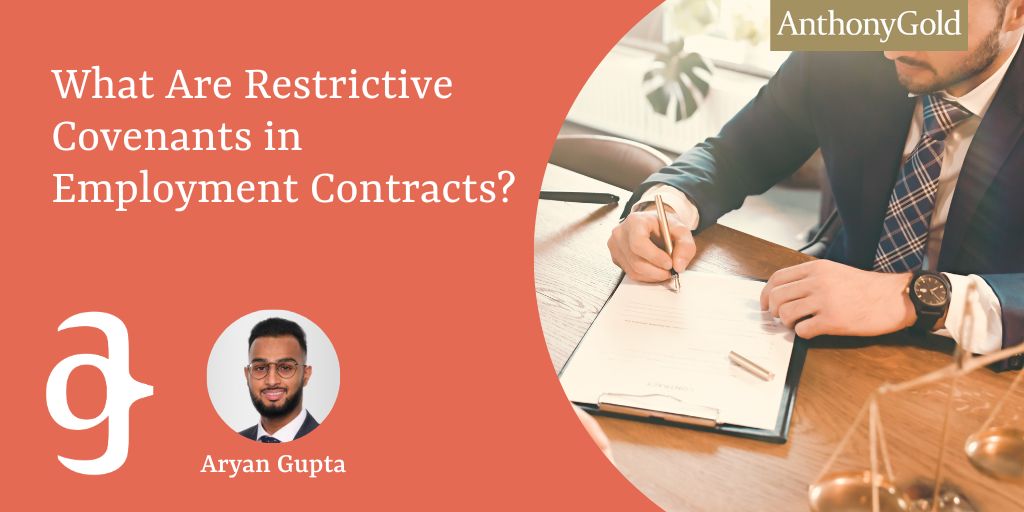Understanding Restrictive Covenants in Employment Contracts

What Are Restrictive Covenants in Employment Contracts?
Restrictive covenants are commonly used in employment contracts to protect a business’s interests after an employee leaves. These legal clauses aim to prevent former employees from engaging in activities that could harm the business, such as working for a competitor or soliciting staff or clients.
For employers, restrictive covenants provide an additional layer of security to safeguard confidential information, trade secrets, and customer relationships. For employees, however, these clauses may feel limiting, affecting future job opportunities or career moves. Balancing the protection of business interests with fairness to employees is key.
Restrictive covenants are not always straightforward, and their enforceability depends on various factors, including the terms of the contract, the employee’s role, and whether the restrictions are reasonable. This blog will explore the different types of restrictive covenants, how they can be enforced, and the importance of ensuring their fairness.
It should be noted that it is important to consider those in advance as they need to be included in an employment contract either before or during the employment period for them to be enforceable. Restrictive covenants cannot generally be added into a contract following termination of employment.
What Are the Different Types of Restrictive Covenants?
There are several types of restrictive covenants that employers might include in an employment contract. Each one serves a different purpose and is designed to protect the business in a specific way. The following table outlines the key types of restrictive covenants:
| Type of Restrictive Covenant | Purpose | Common Duration | Key Considerations |
| Non-Compete Clause | Prevents the employee from working for a competitor or starting a competing business in a defined geographic area after leaving the company. | Typically 3-12 months | Should be geographically limited and tied to legitimate business interests (e.g. senior roles or specialised knowledge). |
| Non-Solicitation Clause | Restricts the former employee from contacting or soliciting the company’s clients or customers to shift business away from the former employer. | Typically 3-12 months | Must be specific to clients the employee dealt with during employment. |
| Non-Poaching Clause | Prohibits the employee from recruiting or encouraging former colleagues to leave the business and join a competitor. | Typically 3-12 months | Focuses on protecting the employer’s workforce and preventing disruption. |
| Confidentiality Clause | Prevents the disclosure of trade secrets, sensitive business information, or confidential data learned during employment. | Typically indefinite | Often enforceable even after the employee leaves, as it protects intellectual property and sensitive data. |
Each of these covenants can be tailored to the needs of the employer, but it’s important to ensure that they are reasonable in scope and duration so to ensure that they can be enforced after termination of employment, should the need arise. Overly broad restrictions are less likely to be enforceable, and employers should therefore focus on clauses that specifically protect their business interests.
When Are Restrictive Covenants Enforceable?
To be enforceable, restrictive covenants must meet certain standards. The key consideration is whether the terms of the covenant are reasonable to protect the legitimate business interests of the employer. Courts and Tribunals will not enforce overly restrictive or unfair clauses that limit an employee’s ability to earn a living.
- Reasonableness Test: A restrictive covenant must be no broader than necessary to protect the legitimate business interests of the employer. This means that the scope, duration, and geographical reach of the restriction must be proportionate to the business’s needs. For example, a non-compete clause that restricts an employee from working in the same industry for five years across the entire country is unlikely to be enforceable.
- Judicial Scrutiny: Courts and Tribunals are careful to ensure that restrictive covenants do not unfairly restrict employees from pursuing their careers. They assess whether the employer has a genuine business interest to protect, such as confidential information, client relationships, or investment in employee training. If the covenant is seen as simply preventing competition without legitimate cause, it is likely to be deemed unenforceable.
Employers must carefully draft restrictive covenants to strike a balance between protection and fairness. Failure to do so may result in the covenant being invalidated by the courts, leaving the business without protection.
What Are Some Common Misconceptions About Restrictive Covenants?
There are several misunderstandings about how restrictive covenants work in practice. These misconceptions can lead to issues when employees and employers don’t fully understand the limitations and legal enforceability of such clauses.
- Myth 1: Restrictive Covenants Always Apply
Not all restrictive covenants are enforceable, even if they are included in an employment contract. Employers must ensure the restrictions are reasonable and proportionate to their business needs. Likewise, employees should be aware that they may have grounds to challenge a covenant that seems excessive. - Myth 2: Length Equals Strength
A common misconception is that the longer the duration of a restrictive covenant, the stronger its protection. In reality, lengthy restrictions may be considered unreasonable, particularly if they restrict an employee’s ability to work for a significant period. Employers should focus on crafting restrictions that reflect realistic timeframes—often 3 to 12 months is seen as a reasonable limit, subject to seniority and the relevant industry. - Myth 3: All Employees Are Bound in the Same Way
It’s often thought that restrictive covenants apply equally to all employees. However, senior employees are more likely to have enforceable restrictive covenants due to their access to sensitive information, strategic knowledge, and client relationships. Conversely, junior employees may have less exposure to confidential business details, making it harder to justify imposing the same level of restrictions. Equally, covenants for back office or support staff may be less enforceable than those for employees in customer-facing roles.
How Are Recent Developments Shaping Restrictive Covenant considerations?
As the workplace evolves, the case law surrounding restrictive covenants is also adapting to new employment trends and economic realities. Several factors are reshaping how restrictive covenants are used and enforced.
- Impact of the Gig Economy
The rise of the gig economy and freelance work has created challenges in the traditional use of restrictive covenants. For workers who operate across multiple projects and sectors, it can be difficult to impose non-compete clauses that limit their ability to earn an income. Courts are more cautious when enforcing these restrictions against freelance workers, given the fluid nature of their employment. - Post-Covid Changes
With the increase in remote working and the shift to more flexible employment arrangements, the geographic scope of restrictive covenants is becoming harder to justify. Employers may have previously been able to restrict employees from working in a certain region, but with the ability to work remotely, this restriction is less enforceable. As a result, businesses need to rethink how they draft non-compete clauses, particularly those based on location.
Additionally, many businesses have shifted to digital-first models, raising the question of how to protect confidential information in an increasingly virtual world. This is leading to a rise in the importance of well-crafted confidentiality clauses and careful management of client data.
Conclusion
Restrictive covenants are an essential tool for protecting business interests, but they must be carefully crafted to be enforceable and fair. Both employers and employees should understand the types of restrictions that may apply and the legal requirements behind them. Striking a balance between protecting business assets and allowing employees to continue their careers is key.
If you need advice on restrictive covenants, whether drafting or enforcement, contact our team of experts on 020 7940 4060 or email us at mail@anthonygold.co.uk.
* Disclaimer: The information on the Anthony Gold website is for general information only and reflects the position at the date of publication. It does not constitute legal advice and should not be treated as such. It is provided without any representations or warranties, express or implied.*
No comments